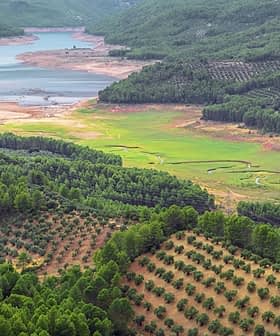European Commission proposals for a greener, leaner farm subsidy system have been roundly rejected by Spain’s olive oil sector.
The EC wants to cut Common Agricultural Policy (CAP) spending in real terms by 9 percent to €435 billion ($603b) for 2014 – 2020. By the end of the decade, CAP would account for 37.7 percent of the EU budget.
Key reforms sought are a €300,000 limit on the subsidies that a large farm can receive, and universal allocation of subsidies via a flat rate per hectare rather than according to production history — a change which would see France and Spain lose the most.

Andalusia’s Minister for Agriculture and Fishing, Clara Aguilera speaks with Enrique Delgado, General Secretary of Infaoliva (photo: Infaoliva)
And, for the first time, 30 percent of payments to farmers would be linked to green targets – such as ensuring tillage farmers grow at least three crops to ensure diversity, and leave at least 7 percent of their land fallow as a haven for plants and animals.
While France, with 17 percent of Europe’s farmland, currently gets almost a quarter of total CAP spending, Jaén is the province that receives the most under CAP, with about €465 million a year, according to the Diario Jaén,
“It receives more money because its farmers work in the olive oil sector, which has historically entrenched rights, and because it is in Andalusia, which is considered one of the key regions for Europe’s food supply and has therefore received a higher level of support than other areas.“
Agricultural lobby group ASAJA said that, overall, the CAP changes would halve subsidies received by Jaén’s olive oil sector and “leave it comatose.”
The Catalan agricultural Union, Unió de Pagesos, said while it agreed there were inequities in the current system, a one-tier flat rate system would be unfair. Allowance should be made for differences in cultivation, such as whether irrigated or rain-fed, and intensive or traditional.
Europe’s agriculture commissioner, Dacian Cioloş, said the proposals were intended to profoundly reform the policy without the need to slash spending, “In order to meet the challenges of food security, sustainable use of natural resources, and growth.”
But his environmental measures were the most universally rejected by EU member states, with claims they were excessive and too much red tape, while environmental groups lamented that they did not go far enough. Spain’s Minister for the Environment, Rural and Marine Affairs, Rosa Aguilar, said she feared they would reduce members’ international competitiveness.
As what could now be at least a year of negotiations begins, Andalusia’s Minister for Agriculture and Fishing, Clara Aguilera, announced last week she hoped to form a lobby group of the main EU olive oil producers — France, Italy, Portugal, Greece and Spain — to jointly defend the sector’s interests.








